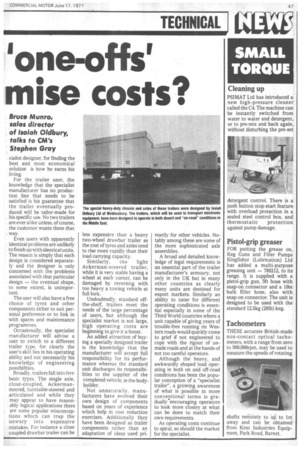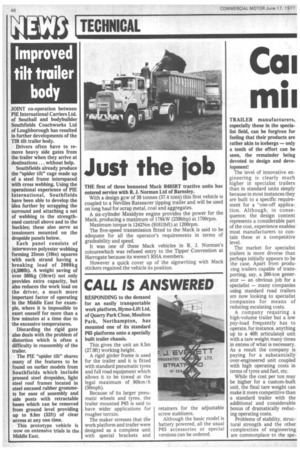'one-offs' mise costs?
Page 49

Page 48

If you've noticed an error in this article please click here to report it so we can fix it.
TRAILER manufacturers, especially those in the specialist field, can be forgiven for feeling that their products are rather akin to icebergs — only a tenth of the effort can be seen, the remainder being devoted to design and development!
The level of innovative engineering is clearly much higher in specialist trailers than in standard units simply because in most instances they are built to a specific requirement for a "one-off application. Although, in consequence, the design content represents a considerable part of the cost, experience enables most manufacturers to contain these at a competitive level.
The market for specialist trailers is more diverse than perhaps initially appears to be the case. Apart from producing trailers capable of transporting, say, a 200-ton generator — an obvious job for a specialist — many companies using standard road trailers are now looking to specialist companies for means of reducing escalating costs.
A company requiring a high-volume trailer but a low pay-load frequently has to operate, for instance, anything up to a 40ft articulated unit with a tare weight many times in excess of what is necessary. As a result the company is paying for a substantially over-engineered unit coupled with high operating costs in terms of tyres and fuel, etc.
While the cost per ton may be higher for a custom-built unit, the final tare weight can make it more competitive than a standard trailer with the additional and considerable bonus of dramatically reducing operating costs.
Problems of stability, structural strength and the other complexities of engineering are commonplace to the spe cialist designer, for finding the best and most economical solution is how he earns his living.
For the trailer user, the knowledge that the specialist manufacturer has no production line that needs to be satisfied is his guarantee that the trailer eventually pro duced will be tailor-made for his specific use. No two trailers are ever alike unless, of course, the customer wants them that way.
Even users with apparently identical problems are unlikely to finish up with identical units.
The reason is simply that each design is considered separate ly and the designer is only concerned with the problems associated with that particular design — the eventual shape, to some extent, is unimportant.
The user will also have a free choice of tyres and other components either to suit personal preference or to link in with spares and maintenance programmes.
Occasionally, the specialist manufacturer will advise a user to switch to a different trailer type, for clearly the user's skill lies in his operating ability and not necessarily his knowledge of engineering possibilities.
Broadly, trailers fall into five basic types. The single axle, close-coupled, Ackerman steered, turntable'-steered and articulated and while they may appear to have reason ably logical applications there are some popular misconcep tions which can trap the unwary into expensive mistakes. For instance a close coupled drawbar trailer can be less expensive than a heavy two-wheel drawbar trailer as the cost of tyres and axles tend to rise more rapidly than their load carrying capacity.
Similarly, the light Ackerman-steered trailer, while it is very stable having a wheel at each corner, can be damaged by reversing with too heavy a towing vehicle at full lock.
Undoubtedly, standard offthe-shelf, trailers meet the needs of the large percentage of users, but although the specialist market is not large, high operating costs are beginning to give it a boost.
An added attraction of buying a specially designed trailer is the knowledge that the manufacturer will accept full responsibility for its performance whereas the standard unit discharges its responsibilities to the supplier of the completed vehicle, ie the bodybuilder.
Not unnaturally, manufacturers have evolved their own design of components based on years of experience which help in cost reduction exercises. Additionally they have been designed as trailer components rather than an adaptation of ideas used pri marily for other vehicles. Notably among these are some of the more sophisticated axle assemblies.
A broad and detailed knowledge of legal requirements is an essential part of the trailer manufacturer's armoury, not only in the UK but in many other countries as clearly many units are destined for export markets. Similarly an ability to cater for different operating conditions is essential especially in some of the Third World countries where a unit capable of giving years of trouble-free running on Western roads would quickly come to grief if not engineered to cope with the rigour of unmade roads and at the hands of not too careful operators.
Although the heavy, and awkwardly shaped load operating in both on and off-road conditions has been the popular conception of a "specialist trailer", a growing awareness of what is possible in more conventional terms is gradually-encouraging operators to look more closley at what can be done to match their own requirements.
As operating costs continue to spiral, so should the market for the specialist.












































































































































































